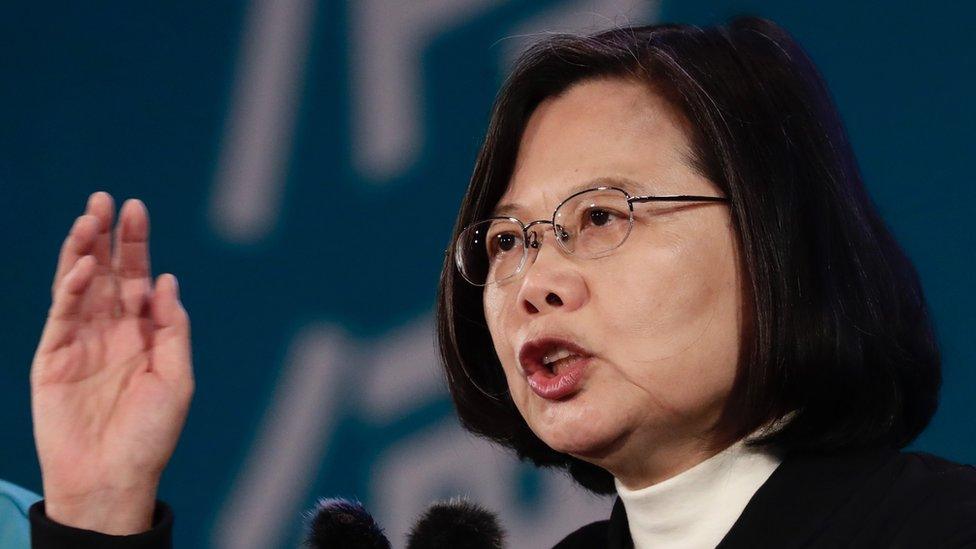US election: The Taiwan-sized challenge facing the next US president
- Published
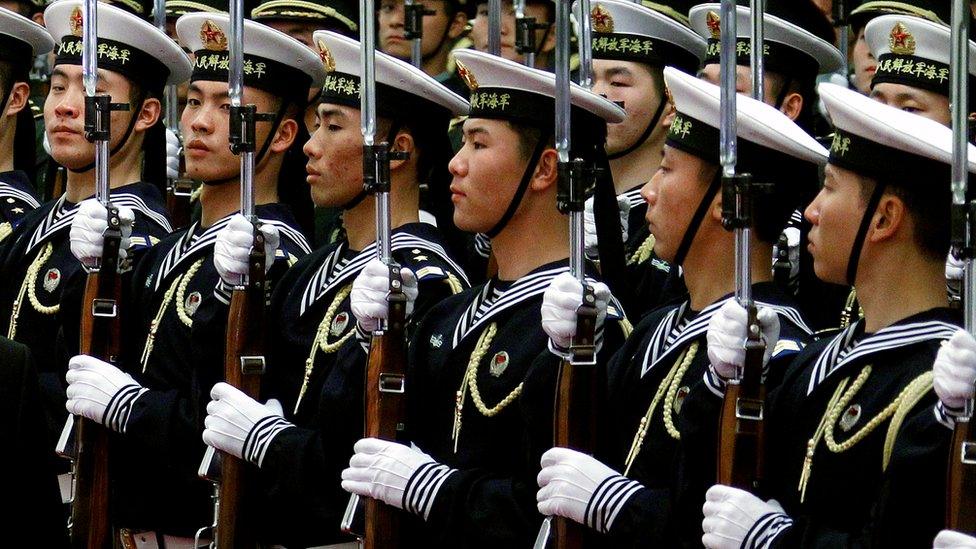
Is China preparing to invade Taiwan? It's a question being discussed with feverish intensity on many China forums right now. And what should be one of the top geopolitical concerns for the incoming US president.
The temperature was raised further on 13 October when China's President Xi Jinping visited a People's Liberation Army (PLA) Marine Corp base in southern Guangdong province and told the marines there to "prepare for war".
In response some newspapers ran headlines suggesting an invasion is imminent.
It almost certainly isn't. But there are good reasons for the urgency with which China experts are now discussing the future of Taiwan.
China and the United States have long stared at each other across Taiwan. Beijing insists the island of 23 million people is China's "inviolable territory".
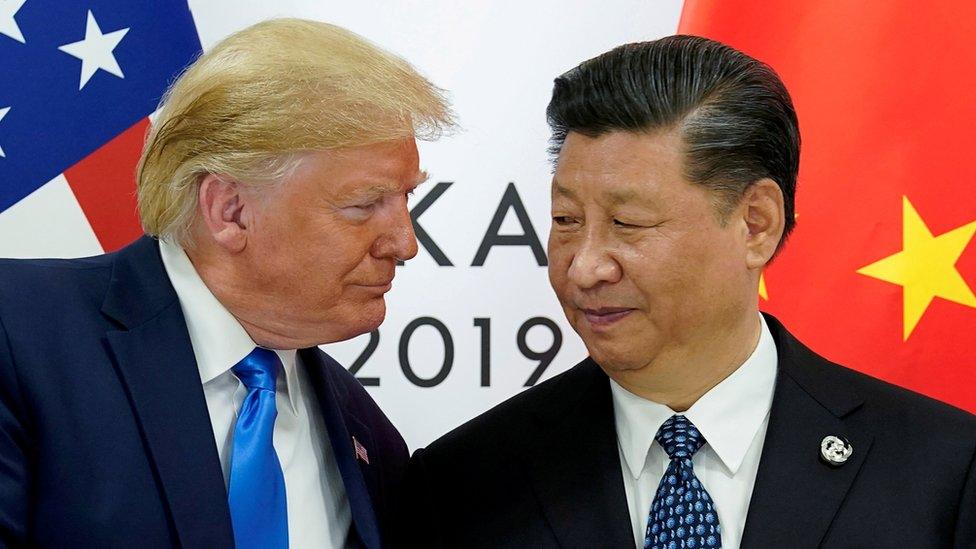
The US and China have long been at odds over Taiwan
Washington says any resolution of their long separation must be done peacefully.
For decades, the uneasy stalemate has continued. Until now.
Xi Jinping eyeing his legacy
There are several reasons the status quo no longer looks tenable. The first is Xi Jinping.
"Xi Jinping wants Taiwan back," says Professor Steve Tsang, director of the China Institute at London's School of Oriental and African Studies. "And Xi Jinping wants to have Taiwan back before he hands over power to whoever comes next."
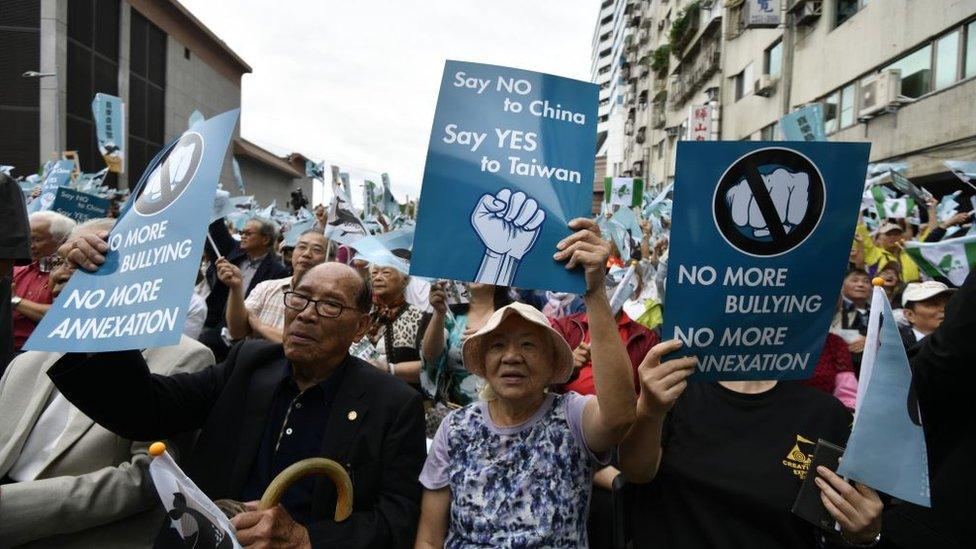
Some Taiwanese vocally support formal independence but most favour the middle ground
Oriana Skylar Mastro, a China military analyst at Stanford University, says her wakeup call on Taiwan came when Xi Jinping forced through the abolition of presidential term limits in 2018, effectively making himself president for life.
"Suddenly everything he said about Taiwan took on a whole different meaning," she says. "The timeline of when he said he wanted this issue resolved is now tied to his legitimacy as leader and his tenure as a leader."
Prof Tsang says Xi Jinping views himself as a great historical figure, with a mission to complete what China's previous paramount leaders, including Mao himself, could not.

"Deng Xiaoping could not get Taiwan," he explains. "Even Chairman Mao couldn't get Taiwan. And if Xi Jinping gets Taiwan, (he) is greater not only than Deng Xiaoping, but Mao Zedong."
Xi Jinping has stated publicly that Taiwan reunification is an "inevitable requirement for the great rejuvenation of the Chinese people". The timetable for completion of his "great rejuvenation" project is 2049, the 100th anniversary of the communist revolution. That is nearly 30 years away.
But there is reason to think Xi is in more of a hurry.
China's growing military might
The first is that China may soon have the military capability to defeat the United States in a war over Taiwan.
"For the past 20 years, the main question that most people ask is, will the United States defend its allies and partners?" says Ms Mastro. "It was a question of resolve. Will the United States come to Taiwan's aid? But as the Chinese military becomes more advanced, the question has shifted from will they, to can they?"
The transformation of China's military from a low-tech "People's Army" to a modern high-tech military, has happened much faster than many had predicted.
The speed and scale of the change was brought home during the huge 70th anniversary parade in Beijing on 1 October last year.
China at 70: Tanks parade on Tiananmen Square
Among the familiar paraphernalia of tanks, artillery and rocket launchers were some very striking new weapons systems, including stealth jets and stealth drones, and so-called "hypersonic glide vehicles". These new systems are designed to strike at US aircraft carrier battle groups, should they try to intervene to protect Taiwan.
Captain James E. Fanell was the director of US Naval Intelligence for the US Pacific fleet until his retirement in 2015.
"I've characterised what I called a decade of concern," he tells me from his new job at the Geneva Centre for Security Policy, "which is right now 2020 to 2030, which I think is the most dangerous time. Both (former President) Hu Jintao and Xi (Jinping) ordered the PLA to have the capability to be able to take Taiwan militarily by about 2020.
"So, they've been working for the last 20 years on orders to have the capacity and capabilities to launch a military invasion against Taiwan."
America's 'failure' in the South China Sea
China has also been gradually testing America's resolve, seeing how far it can go before the US responds to threats against an ally.
According to Capt Fanell, the US has repeatedly failed those tests, allowing China to take control of Scarborough Shoal off the coast of the Philippines in 2012, and then doing nothing to stop China building a series of huge new artificial island bases across the South China Sea.
"What happened at Scarborough Shoal from April to June 2012 is America's biggest foreign policy failure in Asia since our helicopters took off from the roofs of those embassy buildings in Saigon in 1975, external," he says, referring to the US military defeat in the Vietnam War.
"It was a disaster and it really had a debilitating impact on America's national credibility in Asia when we didn't do anything to defend the Philippines."
A BBC team flew over the South China Sea in a US military plane in 2018
Taiwan is not only about getting back China's so-called "lost territories". Control of the island would give Beijing what General Douglas MacArthur once called an "unsinkable aircraft carrier in the Pacific". Ms Mastro says a Chinese victory over Taiwan would completely re-draw the strategic map of Asia.
"If China does fight a war over Taiwan and wins, not only do they get to reunify with Taiwan, but that's basically the end of the role of the United States as a leader in Asia as we know it," she explains. "So, there are many benefits, actually, from the Chinese perspective."
In Washington there is now bipartisan recognition that the threat to Taiwan is growing. In a clear signal to China, the Trump administration has approved billions in arms sales to Taiwan, including, for the first time, advanced air-to-ground missiles.
The risk of miscalculating the US military
But it is still far from clear what the United States would do if Taiwan were attacked. Capt Fanell says that is a mistake.
"We know from history, we know the lack of support to the Kuwaiti government indicated to Saddam that he had a free rein to go into Kuwait," he explains. "We know from the Korean War, statements that were equivocal gave China and Russia this idea that it was OK to attack in the Korean peninsula. If we don't make some definitive statements about who our friends and allies are and what lengths we'll go to defend them, then we leave them at risk."
But Prof Tsang says there is also a lesson for Xi Jinping from those past conflicts. Belatedly, America did come to the aid of the Republic of Korea, and Kuwait. He says China would do well not to underestimate US military resolve once provoked.
"The spirit of the United States military is one that will fight and fight and fight," he explains. "If the Chinese take that into account, I think they may be a bit more cautious in their calculations and the risk of miscalculation may be reduced."
If you add anger and suspicion over Covid-19 to the trade war, the Huawei investigation, the mutual closing of consulates and the ejection of journalists, relations between Washington and Beijing are at their lowest since the 1989 Tiananmen massacre.
There are voices on both sides calling on the next US president to drop the hostility and return to engagement with China. But the consensus among those I have spoken to is that the old type of engagement has failed.
They say the next US president must find a new type of engagement, more honest, more robust, and where the US is much clearer about its obligations and intentions, towards its allies in Asia, including Taiwan.
- Published14 October 2024
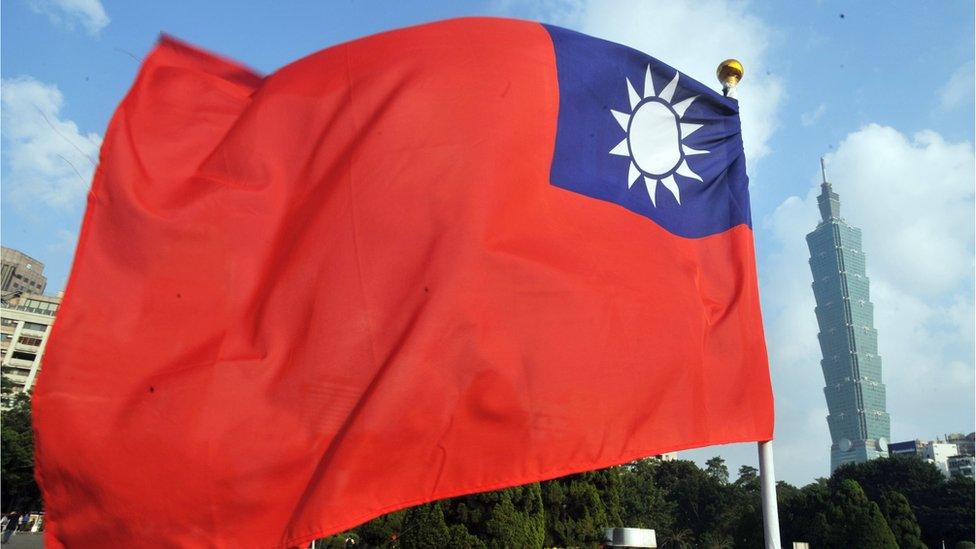
- Published20 January 2020
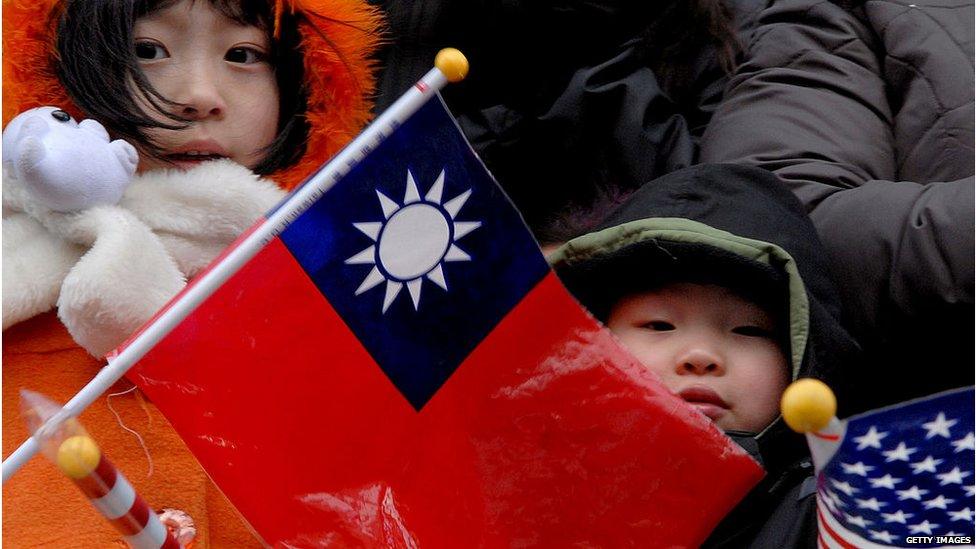
- Published8 January 2024
